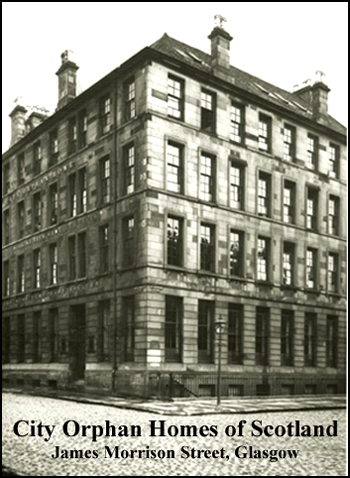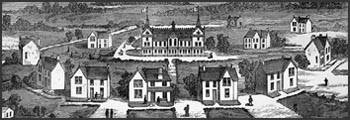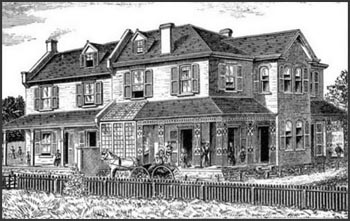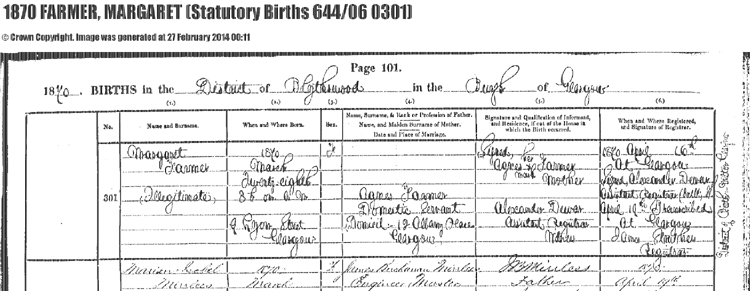
This was the very first night refuge for street orphans. Established by William Quarriers himself, this was the first official presence of Quarriers. The building still exists today on James Morrison Street in Glasgow, next door to St Andrew's in the Square.
Read about William Quarrier
(1829-1903) and Quarrier Homes
The excerpt to the right, the story of Maggie's Voyage below, and other intrguing stories involving the migration of Home Children from Scotland to Canada can be seen on
The Golden Bridge
particularly in the section Narrative of Facts.

Quarriers Village,
Bridge of Weir Scotland
|

All the children sent out by us proceed direct to the Marchmont Home at Belleville, where applications, each accompanied by a recommendation from a minister, doctor, or other responsible person in the district the applicant lives in—are received for them daring the winter. On their arrival, parties within a reasonable distance of the Home are invited to call and see them. When they tlx on a child, an agreement is signed, binding those taking a boy (or girl, as the case may be) to bring him up Christian manner, reserving to us the power to remove him if we think the agreement is not carried out, and giving them power to return him if unsuitable. There is no preraium given, nor is one received by the Home for any child. This voluntary principle runs through the whole work, and the success of the work is, in a great measure, owing to it. Miss Bilbrough is in communication with a great many of the ministers of the Province and many others, who correspond with her as to the welfare of those placed out in their districts. Then there is the regular visitations by our helpers and our own visits to hundreds of the homes, which have satisfied us that everything is done for the good of the children, so that it is hardly possible for a child to be ill-used. without Miss Bilbrough hearing of it at once, when, of course, she removes him. |
Maggie's Voyage
The following interesting account of the voyage of the second party, sent to the .North British Daily Mail by Mr. H. L. Hastings, editor of The Christian, Boston, U.S.A., is worthy of a place here:
The many readers of the Mail who interest themselves in "The Orphan Homes of Scotland” may be glad of a brief account of the voyage of the little emigrants who have just left old Scotia to seek their fortunes in that greater Britain which lies beyond the seas. Descended on my mother's side from the Khoxes and the Hamiltons of Ayr, who formed a part of an earlier emigration when the United States were but British Colonies, and who originally named the Massachusetts town, where I was born, New Glasgow, I could hardly fail to feel an interest in my "kin beyond the sea;" nor could I regard with indifference this effort to transplant some of the little ones from the midst of untoward surroundings to broader and more fertile fields, where bread is not so dear, nor flesh and blood so cheap, as in the densely populated cities of the old world; and so, after a winter spent amid the smoke and fog of London, I was little loath to accept Mr. Quarrier's invitation to return to Boston via Quebec, and accompany a party of orphans, and make myself generally useful to the "weans" on the voyage. At 6:30 a.m. on Friday, May 26, we embarked amid the cheers of friends and. the Greenock boys, who were drawn up on the wharf, and who waved their farewells as the good ship Hanoverian glided from her moorings and started down the Clyde. The first morning was all hurry and confusion, but breakfast came at last, and the children, who had lunched early, felicitated themselves on having " twa breakfasts the day." We passed the ordeal at Greenock, the rosy cheeks and bright eyes of the children making little work for the inspectors, and about 3 P.M. we were on our way to Liverpool. Night came down upon us in the Irish Channel, which maintained its reputation for restlessness; and early on Saturday morning, as something went wrong with the steering gear, the vessel, dropping into the trough of the sea, tossed things about in a manner more lively than agreeable. Our poor little sailors got their first and only fright there, and began to cry, some to the Lord, and some for Mr. Quarrier, who was soon out of his berth and ready to reassure the frightened voyagers. The trouble was soon over, and- morning came with sunshine and calm weather, which continued nearly all the way. Saturday morning, instead of "two breakfasts,' the children got none, and the fishes came in for a fair share of what they had eaten the night before. We were so glad to have this part of the programme attended to while Mr. Quarrier was with us, and we consoled ourselves with the thought that if it were to be done, it were well that it were done at once and over with. At four in the afternoon we were at Liverpool and took in five or six hundred passengers—Scandinavians, Germans, &co making in all 1270 souls on board; and at 8 p.m. the tugs steamed away with the Government inspectors, carrying with them Mr. Quarrier, who, having helped us through the start, the fright, and the sea-sickness, now left us to return to Glasgow. We had little more trouble with sea-sickness, and the children soon fell in for rations with futl ranks, hungry as hawks, and disposing of unreportable quantities of bread and butter, biscuit, soup, porridge, treacle, jam, marmalade, hotch-potch, pluimduff, rice, tea, coffee, &c., having their meals served by themselves in their own comfortable and commodious steerage, entirely separated from the other passengers. In addition to the sixty-five orphans, ranging in age from three to fifteen, including thirteen little boys from three to eight years old, our party consisted of Miss Quarrier, who, by her constant watchfulness over the "motherles weans," and her adroit management of the little ones, reminded one of Solomon's " four things," which, though little, are exceeding wise," and whose watchful diligence clearly indicated that she had no idea that she could make a pleasure-trip of crossing the Atlantic with sixty-five children except as duty is a pleasure to loving and generous hearts. Accompanying Miss Quarrier was Mrs. Gilchrist, just returned from a mission to the soldiers at Gibraltar, whose broad Scotch " brogue" and strong Scotch sense were equally useful in managing the children, over whom she watched with loving care. The additton of Mrs. McEwan, a motherly old lady whom Mr. Quarrier got to take up her quarters with the children, and who looked after them night and day, completed the party ; while the writer picked up the odds and ends of service, and tried to he as helpful as circumstances would permit. The children were as happy as larks, and were universal favourites, their little red riding-hoods distinguishing them, wherever they went, The quarter-deck was assigned as their playground, where they spent their time swinging, singing, rope-skipping, marching, knitting, playing, and romping; watching for whales, and seeing the porpoises and ships and icebergs as they appeared on the horizon, and then vanished out of sight; and then, in less pleasant weather, going to their quarters below, where they sang— "The Lord's my shepherd, I’ll not want," "Be present at our table, Lord," "We are out on an ocean sailing;" also their own "Ocean Hymn," and various sacred songs and solos, not forgetting "Two little eyes," "A. little cock-sparrow," "Be kind to auld grannie," and such other hymns and choruses as their repertoire afforded. Sixty-five more healthy, happy, and well--behaved children it would be hard to find on sea or shore, and they won the hearts and the commendations of passengers. officers, and crew. Aside from regular morning and evening worship, the orphans, with their songs of thanksgiving before and after meals, there were usually two or three religious services held daily on the decks, brief addresses being given by Mr. MacFarlane, Mrs. Gilchrist, Mr. McDonaId, of Dundee, and the writer, there being also a Swedish service, conducted by Mr. N. S. Romberg. On Sunday, June 4, there was held at the same hour, in different parts of the vessel, a children's service, an English service, and another in Swedish for the Scandinavian passengers. Tracts and papers were also distributed, and general order and quiet prevailed. At four A.M. the decks were packed with a living mass, assembled to witness the burial of a little Norwegian child, who had died of inflammation of the lungs. Solemn hymns were devoutly sung by the sad-faced emigrants, whose voices blended in the sweet minor strains of Scandinavian psalmody; words of hope and comfort were said, and the coffin was gently slid into that vast cemetery which has neither monument nor inscription, but which shall hold its treasure safely until the sea gives up the dead that are therein, to stand in the presence of the Judge before the great white Throne. Saturday night we were feeling our way along amid fog and icebergs of which about a dozen were visible at one time; but we came through nicely, and on Tuesday morning, June 6th, we saw the snow, flecked shores of Newfoundland, and shortly were sailing on the glassy surface of the Gulf of St. Lawrence, whence we soon found our way into the turbid waters of the river and on Thursday, June 8th, at noon, we found ourselves safe at the landing. The voyage was without accident, with the exception of the falling of the main gaff, which came crashing down when they were heeling taut the main-sail, through the straightening out of the hook of the peak halyard block, which was made of worthless iron. If the man who put it in bad been under it at that moment, instead of the sailors and two or three passengers who were picked up bruised and bleeding, he would have had a taste of his own work, and might have found a sore spot in his head if there was none in his conscience. It was a mercy that no lives were lost, and that the casualties were not more serious. From Quebec the rest of the journey is by rail, and we trust that the same kind providence which has guided us thus far will still protect us to the journey's end.

Hanoverian Allan Line steamship wrecked in Portugal Cove, Trepassy Bay, Newfoundland |





